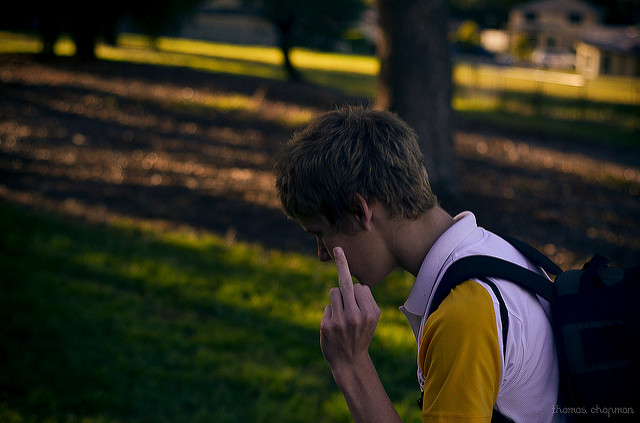We had another fight—my son and me.
He’s 15 years old. Voices raised, doors slammed.
I wanted to apologize the next morning. “That’s not how I want to be as a father to you,” I tried with little success. He didn’t want to talk about it, but I persisted—voices raised again, and I dropped it.
I’m in over my head.
I tried some deep breaths which helped some, but not enough—the voice in my head is strong and still questioning, still afraid, still wondering, “What if?” What if I had laid down the law more firmly, earlier? What if I had said something different? What if his mother were still alive?
It’s been over seven years and it still comes up. Not always, but from time to time, especially in tougher moments. The truth is, my son is a very intelligent young man. He is also quick to challenge and confront—not afraid to speak his mind, unlike how I was at his age. I am proud of him for that. It will serve him well, except when it doesn’t. His mother was more like that, while I was the peacemaker or the jokester. I shied away from confrontation and looked for compromise. It has also served me well, except when it doesn’t.
Three days after our blow up, things settled back to a détente of sorts. We actually had some healthy conversations. He is discovering a passion for history, sociology, and politics. He got that from me, I think—I hope. I like to ask him about what is going on in the world today, as it’s fertile ground for many conversations. He likes to take contrarian views which I admire, even if I don’t agree.
A few days after things had settled down, I was at my acupuncturist for a semi-regular treatment, and she asked me what she always asks: “How can I support you today?”
I shared that I needed “Dad Strength.” Desperately. That and something for my chronic plantar fasciitis. I got on the table, and she checked my pulse and started her treatment.
I don’t know if I actually believe that sticking needles in my body will release blocked chi and allow it to flow through my meridians. I just don’t know. But what I do know is that when I go for treatment, I leave feeling better. Calmer. And my plantar fasciitis is also better than it was.
When I’m on the table, I try to meditate—sort of—or at least focus on my breath. Which means I’m thinking almost constantly, instead of always constantly. I was reflecting on my interactions with my son: What had gone wrong? Why did we argue and fight? Where did it turn?
And then it came to me: I was afraid. It was fear that was driving me. Fear for his safety. Fear for his future. Fear that I’m not a good father. Fear that he’ll never come to terms with the death of his mother, my late wife.
Fear is not the place from which to act—especially when you’re a parent—but, I suspect it’s common. I didn’t think about what my son needed from me, if anything, as a father. I just allowed fear to get the first and the last word.
In my professional life, I work with adults, and we sometimes talk about how our fears—or our highly tuned, threat-seeking brains—affect our ability to consider options, make rational choices, and make the best choices. The parallels to parenting are obvious, and we sometimes draw the analogy at work. But actually doing it? That’s a whole other matter. And yet, with some time to reflect, I thought: Why not use some of the coaching I give to others on myself?
So, as I lay on the table—trying to meditate, with needles in my legs and arms—I went to work on a list:
The first thing is to remember that our moods and emotions come from an interpretation we have of events and actions around us. We can allow our default interpretation to rule, or we can do something else. If we can pause and allow for a generosity of interpretation* we can break out of the mindset that our children are always being defiant and rude—and rather, understand that they are simply being adolescents.
Accepting that reality can open us up to new possibilities as parents and allow us to accept the challenges that come with that age group. Maybe it even allows us to experience some wonder and joy as we witness their growth. It also allows us to treat ourselves with some level of equanimity—something parents can really use.
Second is to ask the question: What kind of parent does my child need today? Some days, it may be that our children need limits and boundaries. Other days, it is compassion and nurturing. And still other days, it is space and distance. Our tendency is to lead from our place of comfort and familiarity. This can be a setup for trying to solve all situations with boundaries and limits or always distance and space. As our children step awkwardly into adulthood, they are looking to us for different things, even when they don’t know how to tell us. It is up to us to pay attention to them.
Third is to maintain a balance of connection with discipline. Boundaries and rules are important—and so is connectedness. The adolescent brain craves connectedness, typically with their peer group, but also with their family. As parents, we aren’t meant to be our children’s friend, necessarily—yet we need to find ways to meet our children where they are and create the time and space to nurture connectedness. Right now I am giving added weight to connectedness as being more important than discipline. Next week? I guess we’ll find out…
Those three items require a decent amount of mindfulness. Whatever your daily practice is can surely help. Journaling is a tool I suggest to clients. It’s accessible and doesn’t take much time. Maybe 5 to 10 minutes a day. Reflect on the past 24-hours, and simply write down what happened.
What happened during that interaction with your child?
Was it positive or not?
What was going on around us?
Was it before or after dinner?
Or was it when he was again late getting to school?
What was my emotion? Anger? Fear? Regret?
It’s not important, necessarily, to analyze—just start by noticing, and write it down.
After going through this list in my head, I had one last thought while not meditating during my acupuncture: We’ll get through this. I took a deep breath as my acupuncturist started removing the needles. I still don’t know about meridians and chi but somehow, I felt my “Dad Strength.”
This is the time for my son to assert his independence, his sense of self, and to grow into his adult skin. I want that for him and know we need to have these conflicts in order for him to break free and for it to all work out. I know this intellectually, just not always in my body. We’ve been through worse as a family, though it’s always the crisis in front of us that is the worst we’ve ever experienced. Regardless, it’s moments like this when I can fully embrace the not always comforting reality of impermanence.
*Note: Generosity of Interpretation comes from Dr. Adrienne Hamcke Wicker at University of Maryland’s Center for Leadership and Organizational Change (where I also work).
~
Relephant:
Why Some Parents & their Children have Great Friendships.
A Guide to Buddhist Parenting.
~
Author: John Robinette
Image: Flickr/Tom Chapman
Editor: Yoli Ramazzina
Copy Editor: Travis May
Social Editor: Travis May










Read 3 comments and reply